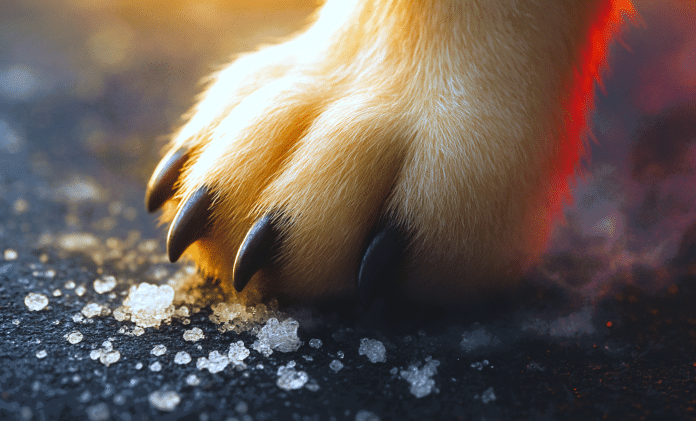Little Rock, AR – As the first frost and icy spots of the season develop across Arkansas, veterinarians are urging pet owners to protect their animals from more than just the cold. The road salt and de-icers used to prevent slick bridges and sidewalks can burn paw pads, irritate skin, and cause toxic reactions when pets lick or ingest them.
Even light road treatments can pose a risk. Many de-icing products contain sodium chloride, calcium chloride, or magnesium chloride, which are effective at melting ice but harsh on pets’ paws. These chemicals can dry out and crack the paw pads, and when dogs lick their feet afterward, they may swallow harmful residue. Ingesting salt can cause vomiting, diarrhea, excessive thirst, or lethargy, and severe exposure can lead to seizures or kidney damage.
Veterinary experts note that pets in southern states like Arkansas are particularly at risk because cold events are brief and unpredictable. Many owners don’t realize that road crews or property managers apply de-icers when frost or black ice is possible. Some products also contain industrial byproducts or heavy metals, making them even more dangerous if ingested.
To help protect pets, veterinarians recommend rinsing paws with warm water after walks and drying them thoroughly. Applying a paw balm or wax before heading outdoors creates a protective layer, and trimming fur between toes helps reduce salt buildup. Booties can also offer reliable protection for dogs that tolerate them. Homeowners should use chloride-free, pet-safe ice melt products around driveways and porches.
With overnight lows dropping into the upper 20s and 30s, icy bridges, overpasses, and sidewalks are likely through the weekend. Veterinarians urge pet owners to watch for signs of paw irritation, limping, or excessive licking after outdoor time.
As the first frost and ice settle across Arkansas, animal experts emphasize that winter’s biggest danger to pets isn’t always the temperature—but the chemicals used to treat it.





